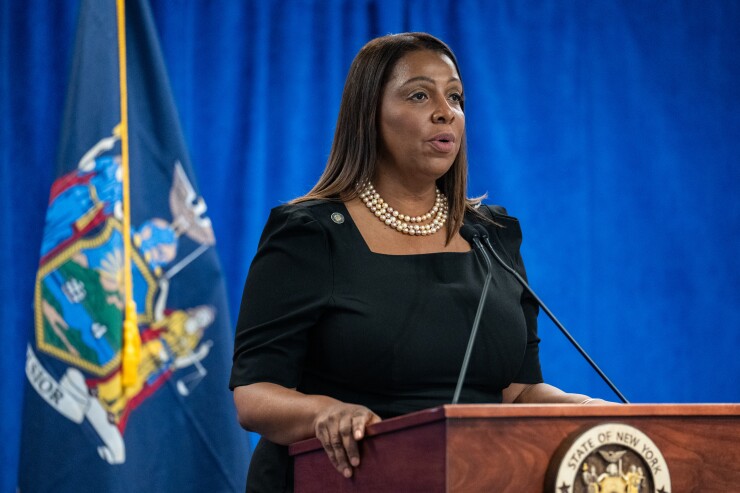New York's attorney general reached a $1 billion settlement with the merchant-cash advance company Yellowstone Capital, with half of that going to forgive small-business loans that the state claimed were illegal.
Yellowstone deceived small-business owners with "predatory loans and outrageous interest rates" that reached 820% even if they weren't visible to borrowers, Attorney General of New York Letitia James said in a news release.
The state, along with California, has
The loans typically involve businesses getting cash in advance based on their future revenues. But James argued that Yellowstone collected fixed amounts from borrowers while promising refunds that the businesses never received, placing a severe strain on them and forcing some to shut down.
"Yellowstone and its executives lined their pockets at the expense of vulnerable small businesses who turned to them for help," James said. "Their predatory loans forced successful companies to close and put New Yorkers out of work."
A lawyer for Yellowstone did not respond to a request for comment.
The settlement would forgive some $534 million in debt for Yellowstone borrowers and force Yellowstone's network of companies to pay upward of $500 million. The company and its leaders have already paid some $16 million to provide restitution.
The company's rise and its debt collection practices were featured in
James said some 1,100 small businesses in New York will get debts forgiven under the settlement. That included a nearly 30-year-old bakery in Manhattan that closed after Yellowstone's "predatory loans trapped the business in a cycle of debt," the news release said.
The company turned to Yellowstone in 2017 after struggling to get traditional loans from banks.
In March, James announced she had also reached settlements that totaled nearly $3.4 million with five individuals who were involved with Yellowstone.
Her office said it is proceeding with a lawsuit against Yellowstone co-founder David Glass and seven other individuals tied to the firm, plus the two companies that absorbed Yellowstone in 2021.
Though industry advocates say practices vary among lenders, the Yellowstone case has brought more scrutiny to the merchant cash advance industry from policymakers.
Former U.S. Sen. Sherrod Brown, the Ohio Democrat who until recently chaired the Senate Banking Committee, has raised concerns over merchant cash advances.
Lawmakers in statehouses across the country have also weighed laws that increase the disclosures lenders must provide to small-business borrowers.
New York and California have been more aggressive, forcing lenders to disclose the APRs on their loans. Industry advocates have said APRs are unworkable and misleading in merchant cash advances, which are tied to fluctuating business revenues and don't have a specific term attached to them.
States such as Virginia and Utah have passed laws that require more disclosures for small-business loans, though they've opted to exclude APR disclosures partly due to those industry arguments.







